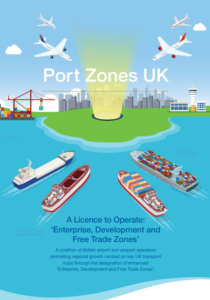A new report is calling on the UK Government to grant special economic status to airports and seaports, in order to stimulate international investment, reshore manufacturing and ultimately lower prices for consumers in a post-Brexit Britain.
The report was released this week by Port Zones UK, a new coalition of British airport and seaport operators, who seek to promote regional growth centred on key UK transport hubs, through the designation of enhanced ‘Enterprise, Development and Free Trade Zones’.
Founding members include the British Ports Association (BPA), Regional and City Airports (RCA), the Port of Milford Haven, the Port of Tyne and the Institute for Exports.
The report comes in response to a recent announcement by UK Government, revealing plans to create up to 10 free ports across the UK after Brexit, allowing firms to import goods and then re-export them outside normal tax and customs rules.
The report – ‘A Licence to Operate: ‘Enterprise, Development and Free Trade Zones’ – looks in more detail at the potential policy measures needed to make a success of any contemporary free ports programme.
Port Zones UK states that the UK’s imminent departure from the EU has created a fresh impetus for a new and innovative growth-generating policy in regional and coastal communities.
However, business conditions need to be created which increase the flow of foreign direct investment, which is central to the future of Great Britain.
Specifically, the report states that ‘zonal’ enhancements to the terrestrial and marine planning systems, as well as modifications to business focused policies of enterprise zones, need to be overlaid with any free port designation.
The report reveals three key areas of detailed policy which the Government needs to focus on. These include:
- Speeding up the process and granting of planning permissions for development.
- Ensuring that the marine and terrestrial planning systems relating to ports are closely coordinated to expedite marine licences.
- Reducing delays arising from environmental legislation such as the Habitats Directive and environmental impact assessments.
…To forge new trade agreements and transition existing ties, strong domestic foundations are needed to maximise the value of inbound and outbound business flows through our international gateways. Our report examines in detail the required changes to planning and the designation of enterprise zones. These need to be considered as part of the Government’s planned free port programme. If done successfully, they can bring critical benefits to the UK,
…Richard Ballantyne, from Port Zones UK, and Chief Executive at the British Ports Association said.
The report also examines the different forms that the ‘Enterprise, Development and Free Trade Areas’ could take as demonstrated by members of the new association.
These include the following case studies:
- The Port of Tyne proposes a ‘virtual’ free zone to bolster UK advanced manufacturing.
- Regional and City Airports is promoting airport-based free trade development across their UK operations which includes Bournemouth Airport.
- The Port of Milford Haven is seeking to create an energy and fishing focused free trade zone.
When overlaid with free trade areas, enhanced ‘Enterprise, Development and Free Trade Zones’ would: reduce the costs of trade, create a more attractive business investment environment, reshoring of manufacturing and processing facilities across a range of sectors, improve employment in some of the most hard-to-reach economic areas of the country and, ultimately, lead to lower prices for UK consumers,
…the report concludes.
Explore more herebelow:


































































